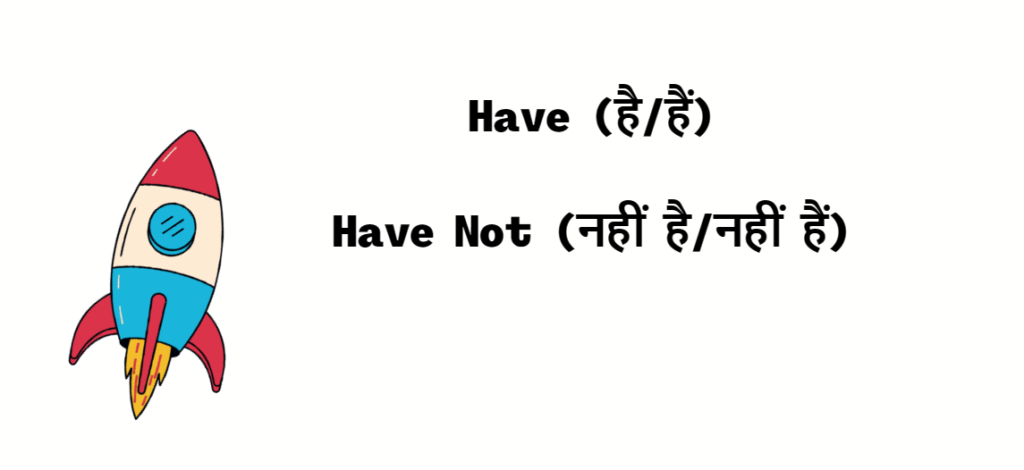Usage Of Have & Have Not
How do you use the verb ‘have’ & ‘have not’ in English?

Introduction to the Usage of Has, Have, and Had (and their Negatives)
हिंदी परिचय: इस लेख में हम सीखेंगे कि अंग्रेजी भाषा में has, have और had का उपयोग कैसे किया जाता है। इसके साथ ही हम इनके नकारात्मक रूपों का भी उपयोग जानेंगे। हम उदाहरणों के साथ इन शब्दों का सही तरीके से प्रयोग करने का तरीका समझेंगे, ताकि आप इनका बेहतर उपयोग कर सकें।
Usage of Has, Have, and Had (और उनके नकारात्मक रूप)
Has (hæz)
- Hindi: होता है
- Meaning: Used with he, she, it, or singular nouns to indicate possession or state of being.
- Affirmative Example: She has a beautiful garden.
- Hindi Translation: उसके पास एक सुंदर बगीचा है।
- Pronunciation: शी हज़ अ ब्यूटीफुल गार्डन।
- Negative Example: She does not (doesn’t) have a beautiful garden.
- Hindi Translation: उसके पास एक सुंदर बगीचा नहीं है।
- Pronunciation: शी डज़ नॉट (डज़न्ट) हैव अ ब्यूटीफुल गार्डन।
- Similar Terms: Possess, owns
Have (hæv)
- Hindi: होते हैं / होना
- Meaning: Used with I, you, we, they, or plural nouns to indicate possession or state of being.
- Affirmative Example: They have a big house.
- Hindi Translation: उनके पास एक बड़ा घर है।
- Pronunciation: दे हॅव अ बिग हाउस।
- Negative Example: They do not (don’t) have a big house.
- Hindi Translation: उनके पास एक बड़ा घर नहीं है।
- Pronunciation: दे डू नॉट (डोंट) हैव अ बिग हाउस।
- Similar Terms: Possess, own
Had (hæd)
- Hindi: था / थे / थी
- Meaning: Past tense of have/has, indicating possession or state of being in the past.
- Affirmative Example: He had a pet dog when he was a kid.
- Hindi Translation: उसके पास बचपन में एक पालतू कुत्ता था।
- Pronunciation: ही हैड अ पेट डॉग व्हेन ही वॉज़ अ किड।
- Negative Example: He did not (didn’t) have a pet dog when he was a kid.
- Hindi Translation: बचपन में उसके पास पालतू कुत्ता नहीं था।
- Pronunciation: ही डिड नॉट (डिडन्ट) हैव अ पेट डॉग व्हेन ही वॉज़ अ किड।
- Similar Terms: Possessed, owned
Examples in All Forms
Has (Present Tense, Singular)
- Affirmative:
- Example: She has a car.
- Hindi Translation: उसके पास एक गाड़ी है।
- Pronunciation: शी हज़ अ कार।
- Negative:
- Example: She does not (doesn’t) have a car.
- Hindi Translation: उसके पास एक गाड़ी नहीं है।
- Pronunciation: शी डज़ नॉट (डज़न्ट) हैव अ कार।
Have (Present Tense, Plural or I/You)
- Affirmative:
- Example: We have a meeting at 10 AM.
- Hindi Translation: हमारी दस बजे बैठक है।
- Pronunciation: वी हॅव अ मीटिंग एट 10 ए ऐम।
- Negative:
- Example: We do not (don’t) have a meeting at 10 AM.
- Hindi Translation: हमारी दस बजे बैठक नहीं है।
- Pronunciation: वी डू नॉट (डोंट) हैव अ मीटिंग एट 10 ए ऐम।
Had (Past Tense, Singular and Plural)
- Affirmative:
- Example: They had a wonderful vacation last year.
- Hindi Translation: पिछले साल उनकी अद्भुत छुट्टियाँ थीं।
- Pronunciation: दे हैड अ वंडरफुल वेकेशन लास्ट ईयर।
- Negative:
- Example: They did not (didn’t) have a wonderful vacation last year.
- Hindi Translation: पिछले साल उनकी अद्भुत छुट्टियाँ नहीं थीं।
- Pronunciation: दे डिड नॉट (डिडन्ट) हैव अ वंडरफुल वेकेशन लास्ट ईयर।
Summary in Hindi
सारांश: इस लेख में हमने has, have और had के उपयोग को विस्तृत रूप से समझा। हम यह भी सीखे कि इन शब्दों का नकारात्मक रूप कैसे बनाना है। उदाहरणों और उच्चारणों के साथ, हमने यह समझा कि विभिन्न संदर्भों में इन शब्दों का सही तरीके से उपयोग कैसे किया जाए। इस जानकारी के द्वारा, आप इन शब्दों का बेहतर उपयोग कर पाएंगे और अपनी अंग्रेजी भाषा कौशल को और भी सुधार पाएंगे।

